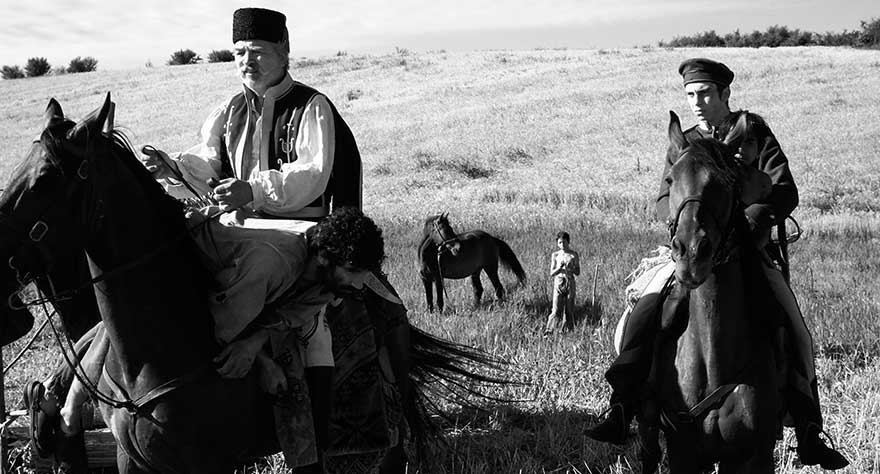
Stark history and stunning imagery combine to form the backdrop for Radu Jude's gorgeous and raucous Romanian comic adventure.


Stark history and stunning imagery combine to form the backdrop for Radu Jude's gorgeous and raucous Romanian comic adventure.

My earliest recollection of watching a road movie dates back to my youth when a local TV station aired the series of Bob Hope/Bing Crosby/Dorothy Lamour Road to… comedy pictures. Since then, I’ve amassed a lot of cinematic road miles with everything from It Happened One Night to Planes, Trains, and Automobiles, and from Thelma & Louise to Nebraska. The latest offering of what is most definitely a road movie is set not in 20th century America, but rather 19th century Romania. It’s unlike any road movie I’ve seen before but in the most positive of ways.
Radu Jude’s Aferim!, set in Wallachia (Romania) in 1835, tells the tale of Costandin (Teodor Corban), a law enforcement official who, with his son Ionita (Mihai Comanoiu), embarks on a manhunt. The man they are hunting is Carfin (Toma Cuzin), a gypsy who was caught having an affair with the wife of Iordache (Alexandru Dabija), a boyar (high-ranking aristocrat) now fixed on revenge. Costandin and Ionita trek on horseback across various terrains, searching from village to village to find their man.
If that sounds like a Golden Age Hollywood western, believe me when I say it feels like one, too. This is just one of the great joys of Aferim!—how Jude, who co-wrote the screenplay with Florin Lazarescu, structures the film in a way that harkens back to a film like Howard Hawks’ great western Red River. In that film, John Wayne and Montgomery Clift play a father/(adopted) son leading a cattle drive along the Chisholm Trail, but it isn’t getting from Point A to Point B that’s important; it’s what happens during the drive that is key. The same approach is taken here. The pursuit of Carfin is little more than an excuse to allow circumstances to unfold with and between the father/son duo during the trip. In both cases, the journey is more important than the destination.
More homage paid to the American western—or rather, more specifically, paid to director John Ford, a master of the genre—is Jude’s use of B&W film and his compilation of stunning long shots of the Romanian countryside. Helping Jude achieve his vision is cinematographer Marius Panduru, who dulls the contrast between the darks and lights to achieve something more visually fitting to humanity’s geo-centric bleakness of the time period.
Aferim! does not hesitate to depict the cruel history of slavery, racism, misogyny, and lawless corruption that existed in that region and at that time. The abuse of gypsy slaves, both verbal and physical, ranges from unsettling to harrowing (particularly in one instance of justice meted vigilante-style). Women are, by law, inferior to men, and the attitude towards other ethnicities, especially in one chunk of dialogue spewed by a clergyman (!), is shocking. Given the abundance of gypsy slaves in that part of the world during that era, the reminders of how cruel a people they were is constant. Being juxtaposed against such a beautifully lensed backdrop makes it that much more unforgettable.
Jude adds one additional dimension to his film that doesn’t soften the blow of dealing with Romania’s dark history head-on, but it sure does provide the occasional respite: humor. And not just any humor, but bawdy, raucous humor that uses foul language so liberally it’s like the script was seasoned by a salt shaker full of hand grenades. The frankness of language is initially disarming given the visual aesthetic, the need for subtitles, and the blunt delivery, but it quickly becomes a natural part of the film’s dialogue, mostly delivered by Costandin as if he were a character created by Judd Apatow.
As for Costandin, he’s a bullish, boorish old man whose verbal arsenal is never short on hilarious stories, couplets, quotes, or homespun wisdom, all of which he imparts on his son. (My favorite line: “Even a fallen tree rests.” Whatever that means.) Teodor Corban, who is in nearly every scene and has more than the most dialogue of any player, performs marvelously in this role. He’s a natural, delivering his lines with great bombast but never to the point of caricature.
Rounding out this excellent production are Dana Paparuz’s costumes and Trei Parale’s Romanian folk-infused score. Both add a high degree of authenticity to the film that helps transport the viewer to that point in time.
The triple-threat of imagery, history, and comedy, salted with language and made even better by a terrific lead performance, all combine to make Aferim! a road picture like no other. This is my first Radu Jude film, and it’s one that has me eager to find his previous two.